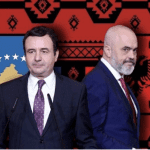By Janusz Bugajski
A year of major international decisions is fast approaching. U.S. policies during 2007 will determine the long-term security of several crisis regions. The status of Kosova is the most important unresolved item on the Balkan agenda. Most capitals seek a prompt decision over Kosova’s statehood to remove ambiguities that undermine security, prevent cross-border cooperation, and discourage foreign investors.
The Kosova decision presents an opportunity and a risk for the wider region. An internationally mandated solution limiting Kosova’s independence will be more destabilizing than full statehood. It would unsettle existing political institutions and spur radicalism among a growing army of frustrated youths. In the event of a decision for Kosova’s full independence, there is little the Serbian government can do except exclude itself from the EU and isolate itself from neighbors.
Washington seeks to secure the remaining piece in the Balkan puzzle in order to turn responsibility for the entire region over to the EU. The White House wants to focus attention on the Middle Eastern crisis where there are no easy solutions.
The war in Iraq has seriously eroded the credibility of the Bush presidency and the effectiveness of American leadership. In order to restore its global stature, the U.S. will need to pacify Iraq and Afghanistan and not become embroiled in civil wars that provoke anti-American terrorism.
If Iraq descends into complete ungovernability, political chaos, ethno-religious cleansing, and sectarian civil war, public pressure for a full U.S. military withdrawal could become irresistible. If the Iraqi operation is judged to be a foreign policy failure then the implications for U.S. policy will be profound.
Damaged American prestige and an unwillingness to engage abroad for fear of repeating its Middle Eastern errors, will encourage further instabilities. Iran and North Korea will challenge the security of their neighbors by pursuing nuclear weapons programs. A U.S. evacuation from Iraq and a growing Iranian threat would endanger Israeli security, undermine the unity of Lebanon, and increase threats against U.S. forces throughout the Persian Gulf region.
Perceived U.S. weakness in the Middle East would embolden the regime in North Korea to escalate its threats against South Korea and Japan. Pyongyang would calculate that in the middle of an election campaign with a much weakened presidency Washington will lack the determination to thwart North Korea’s regional ambitions.
A depleted American military capability could revive a number of disputes, including the Taiwanese-Chinese conflict over sovereignty and the Pakistani-Indian dispute over territory. A weakened and internally preoccupied America will certainly unnerve close U.S. allies around the world, making them more vulnerable in dealing with regional challenges.
An Iraqi fiasco and a further deterioration in Afghanistan would damage NATO’s status as the most effective international alliance. And the EU would increasingly find its “soft security” diplomacy an inadequate tool without an effective military component.
Russia will also seek to exploit America’s hesitation as a global leader. In addition to increasing pressures on its near neighbors in Ukraine, Georgia, and Moldova to rejoin the Russian orbit, Moscow will use all available policy tools to regain control over former East European satellites, create splits within the EU, and drive wedges between Europe and America.
In his last year in office, President Putin will be intent on displaying Russian power on the global stage. One cannot discount that Putin will run again for office if there is mass demand for the present Constitution to be changed to enable a third presidential term.
With all the uncertainties and instabilities looming and the U.S. preoccupied with elections and a need to redefine its international role, there will be new opportunities for “rogue states” and terrorist networks to assert themselves. Unless the U.S. together with its allies can implement an effective international agenda, 2007 will demonstrate that the world is heading toward greater insecurity without a confident and protective America.
2007: A Year of Promise and Peril

Change font size:









